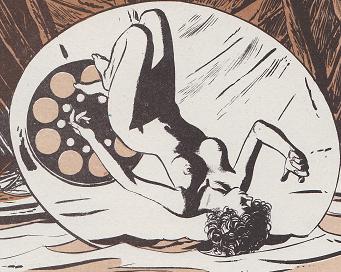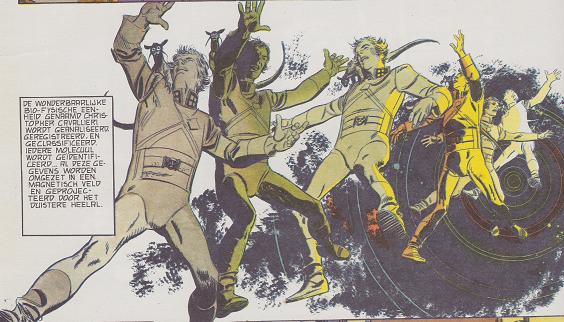Not the best way to start the day, learning that Paul Gillon had died. One of the giants of French comics, with a career dating back to the 1940ties and who was still producing new work as recently as a few years ago, Paul Gillon was never as well known as e.g. Moebius in English speaking countries, with little of his work having been translated — as per usual Lambiek’s comiclopedia hasa good bare bones overview of his career. For a more extensive tribute to him, the ActuaDB obituary Tom Spurgeon linked to is a good start, though obviously in French.

For me personally Paul Gillon was the man behind one of the best science fiction comics ever created, Les Naufragés du Temps (Castaways in Time). The first story in this series was published in 1964, in collaboration with another French giant, Jean-Claude Forest, who scripted the first four albums. Gillon returned to this series in the late seventies, taking over writing duties from Forest with the fifth story, having updated some of the original stories first. With and without Forest, in Les Naufragés du Temps Gillon managed to create a mature, lush space opera, almost Vancean in the interesting worlds it showcased, with a big dose of New Wave sensibility.
The series revolved around Christopher and Valerie, cryogenically frozen and launched into elleptic orbits around the Sun at the end of the twentieth century when Earth was suffering an attack of extraterrestial spores. A thousands years into the future Christopher is woken up and goes on a quest to find his lost love. Though he is quickly reunited with Valerie, plot twists and circumstances keep interfering and it doesn’t help that he seems to be falling in love with every other woman in the series as well. There’s Mara, the no-nonsense scientist who helped recover Christopher from his slumber, the little girl robot assassin Bébbé, the whore Quinne, whose left hand was mutated into a giant claw by the series’ main villain, the Tapir: all fall for him as soon as they meet him. It’s very seventies in this regard, with a lot of bare boobs and a bit of softcore sex.
Most of the stories sees Christopher and his allies and friends move around the Galaxy trying to escape from the clutches of the Tapir and the various other villains, searching for Valerie and discovering new exotic locales. Gillon had a flair for those. In the fourth album for example, “L’Univers Cannibale”, Christopher and co move through a wormhole into another universe — in the end it turned out to be a literal wormhole, that universe being a giant cosmic tapeworm!

Paul Gillon’s art is instantly recognisable, in the realistic tradition, but unlike anybody else working in this tradition. There’s a static feel to his art and composition, his characters caught just before or after a moment of action, posed even when fighting for their lives. They have no sense of movement, even when in full flight — Gillion is an artist who uses little exagerration to show movement, which lends a stilted quality to his art. His characters are not handsome, with Christopher not just being a bit on the porky side, but definatively balding too, a convincingly middle aged man. His female characters are more conventionally pretty, but not the classic femme fatales and pinups of other comics. They’re pretty in a way that a woman you see in the street is pretty, not supermodel pretty. In general all his characters seem drawn from life, without being too obviously based on a particular model.
Part of Gillon’s appeal as an artist is that he was, even more so than the average Metal Hurlant/Heavy Metal artist, not adverse to drawing pretty women having sex. This is still somewhat restrained in Les Naufragés du Temps, but takes centre stage in his next science fiction series, La survivante, about a young woman who’s the only survivor of the apocalypse that left all other people dead, but their world undamaged and filled with robots eager to do her bidding to fullfill their programming. Which includes quite a bit of sexual stimulation as well. This may seem juvenile and prurient, but Gillon’s interest in these matters is genuine as far as I can determine; it’s present in all of his work I’ve read.
Les Naufragés du Temps has only had its first four volumes translated into English, all long out of print. In this golden age of comics publishing, with more comics being reprinted than ever before, surely there’s some publisher willing to take a gamble on a series of just ten albums of one of the best science fiction series ever published?